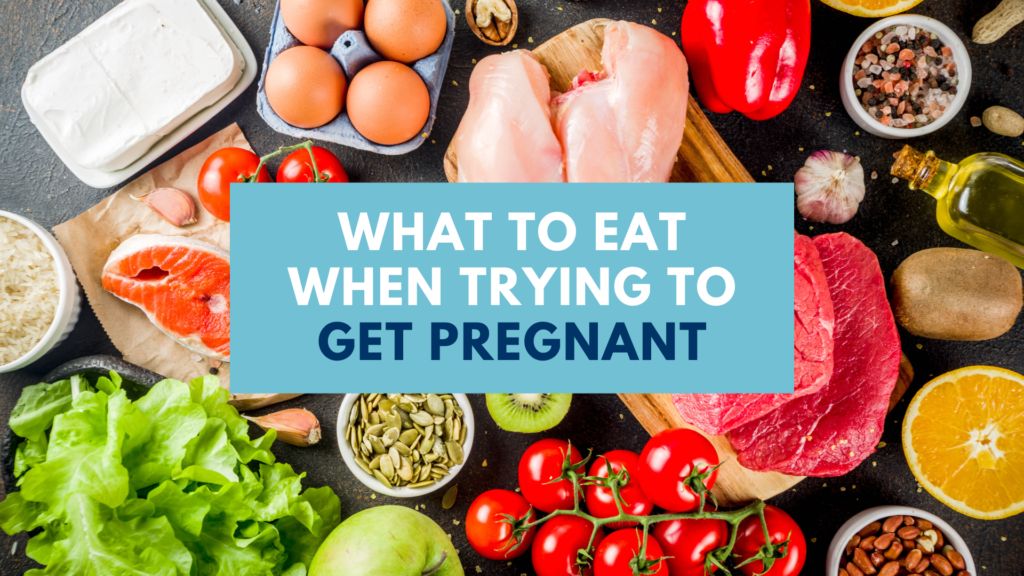What to Eat When Trying to Get Pregnant

Knowing which advice to follow when trying to get pregnant can be stressful and overwhelming when everyone around you has input. From what to eat and what not to eat, to suggestions to try yoga, acupuncture, or Pilates, there’s a ton of information out there. While well-intentioned friends may offer advice that works for them, it can help to look at food and fertility studies to know vital nourishment to add to your diet and what to avoid on your pregnancy journey.
What nutrients and food groups should you incorporate?
What does diet have to do with reproductive health? Recent studies suggest quite a lot. While some nutritional advice trends over time, some is time-tested, and research backed. Let’s look at which nutrients to add to your plate when supporting a fertility journey.
- Folic acid: A 2017 review published in the American Journal of Obstetrics and Gynecology examined the relationship between diet and fertility and found that supplemental folic acid lowers the frequency of infertility. Not only that, but it can also reduce the risk of pregnancy loss. Even if you are utilizing assisted reproductive technology (ART), supplemental folic acid can help improve live birth rates. You can find folic acid, or folate, in dark leafy greens like spinach and kale, beans, nuts, broccoli, and eggs.
- B12: B12 can be beneficial when trying to get pregnant. Insufficient vitamin B12 levels can disrupt ovulation. You can get vitamin B12 in eggs, clams, oysters, nutritional yeast, and some fortified nondairy milk. As most B12 occurs in animal products, if you are vegan or vegetarian, supplemental B12 is available.
- Omega-3 fatty acids: Omega-3 fatty acids can help regulate hormones, which is essential for ovulation. You can find Omega-3 mainly in fish (such as mackerel or salmon), eggs, and flaxseed.
- Healthy diets: What defines a “healthy diet”? The 2017 review mentioned earlier defines a healthy diet as one that favors seafood, poultry, and whole grains and is rich in fruits and vegetables. A healthy diet can improve fertility across genders. For male infertility, there is also some evidence that healthy diets such as the Mediterranean diet can improve semen quality.
- Prenatal vitamins: While not a food group, it is advisable for people planning to become pregnant to take a prenatal vitamin. Prenatal vitamins can help supply nutrients needed to support a pregnancy, like iron, which allows blood to supply oxygen to a fetus.
- Protein: Ample protein can help a fetus grow. While you can find protein in meats, dark leafy greens, legumes, tofu, beans, and nuts are also good sources.
- Fiber: Diets high in fiber may also help support fertility. You can find fiber in all fruits and vegetables, whole grains, and legumes.
Which foods should you avoid?
When preparing your body for pregnancy, you’ll want to avoid or limit certain foods. A 2018 study of over 5,000 women found that frequent fast food with little fruit increased delays in getting pregnant. Sugar in the standard American diet is higher than ever, with most Americans consuming seventeen teaspoons daily, a staggering difference from the recommended six teaspoons. Processed sugar, specifically by way of sugary beverages, is associated with decreased fertility across some studies.
While we know that Omega-3 fatty acids are helpful for fertility, trans fats have the opposite effect and can decrease fertility. Trans fats occur naturally in animal products, like beef, milk, lamb, or cheese. Artificially produced trans fats are found in foods like chips, vegetable shortening, margarine, processed frozen foods, and deep-fried foods.
While adequate protein is essential, red meat is associated with lower fertility. In a cohort mentioned in the above review, one additional serving of meat per day was found to increase the risk of ovulatory infertility by 32%. In a different cohort, women who consumed red meat before undergoing IVF had a negative influence on embryo development and chances of clinical pregnancy.
Researchers have raised concerns about the environmental contaminant risk of consuming meats and fish, such as seafood with high mercury levels. In a different study, those who consumed more plant protein from vegetables had a 66% lower risk of infertility related to ovulatory disorders.
What about soy? While soy has developed a pretty bad rap over the last decade, the review asserts that it has not been consistently found to cause infertility. It could be helpful for women in infertility treatment.
Of course, getting the right vitamins and nutrients to support a pregnancy is essential. However, it’s important not to overdo it with excessive or the wrong vitamins. Too much vitamin A, for example, can harm a developing fetus. If you’re unsure of which or how many supplements to take, always consult your doctor.
When should you eat?

It’s important to remember that just as essential as knowing which foods to consume is making sure you are eating enough. The right number of meals and snacks per day depends on your body, though researchers generally recommend at least three meals per day. Prolonged periods of withholding food can increase cortisol levels, the body’s stress hormone. Have a long day ahead? Prepare snacks like nuts, seeds, protein, fruits, or veggies to have on hand.
Incorporating an Intuitive Mindset
Practicing mindfulness can help you eat intuitively, giving your body what it needs and when it needs it. Intuitive eating can also help with stress reduction as a mindfulness practice, which may be helpful for fertility. Intuitive eating uses skills like honoring your hunger, cravings, and satiety instead of following a set diet or rules around when you should eat compared to others.
Rest assured, it’s impossible to follow a perfect diet all the time. Moderation is key. Proper nutrition can help reduce the risk of some infertility problems. Eating well helps prepare the body for a pregnancy, even when utilizing fertility care. Eating a well-balanced diet is wise for body and mind when trying to get pregnant.
DISCLAIMER: THIS BLOG DOES NOT PROVIDE MEDICAL ADVICE
The information, including but not limited to, text, graphics, images, and other material contained in this content are for informational purposes only. No material in this content to be a substitute for professional medical advice, diagnosis, or treatment. Always seek the advice of your physician or other qualified health care provider with any questions you may have regarding a medical condition or treatment and before undertaking a new health care regimen, and never disregard professional medical advice or delay in seeking it because of something you have read in this content.







